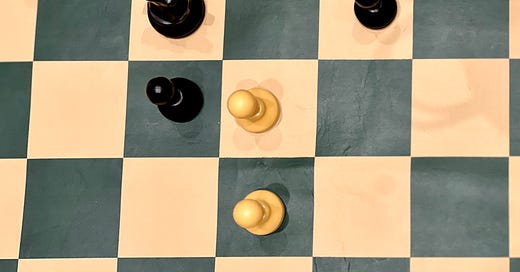What Chess Kids Taught Me About Surviving Political Chaos
Life lessons from a chess tournament
Hiya Friend!
Before we begin, please note that this piece discusses political anxiety, historical trauma, and community resistance. It includes references to coup experiences and immigration concerns. Feel free to engage with this content at a suitable pace and in ways that feel safe for you.
The Opening Move
As I write to you, I realize that every move we make carries weight. I'm sitting in a large holding room at a conference center in Chicago, where my tween competes in a chess tournament.
I've been intimidated by chess for a long time as it seems only for “really smart people.” But watching hundreds of 4th-8th graders, their heads bent in concentration absorbed in their game, I'm questioning my limiting beliefs. The Black and Brown kids, in particular, move with such certainty through their games, that they encouraged me to ask for a chess lesson right then and there.
I’ve come to understand that in chess, the opening moves matter. Every piece on the board has a power--even the ones often overlooked.
Middle Game
Let me be honest with you, the current political climate in the US has my stomach in knots. Each morning's news gives me the emotional equivalent of that stomach-drop feeling you get on roller coasters.
I've been reading the paper and my favorite Substack sources for news, calling my representatives, and still feeling that creeping anxiety about what the future holds for folks like us. These actions resemble studying the board like a chess player, analyzing past matches while calculating countermoves.
I feel uneasy about our political situation because I recognize patterns of having lived through a coup d'état. For me, this isn’t just a fancy French term—it's a lived experience that woke me up at 3 a.m. last night.
Now, if you're thinking: “Stay in your lane, Martine. Talk about creativity.”
Here's the thing — there’s this perceived false choice between being politically active and being a creative. For POCs and marginalized people, our personal lives are political; our art cannot be separated from our lived experiences.
Here is what accompanying my son to numerous chess tournaments over the years has taught me; the most powerful moves happen when you break the pattern of your play.
The Power of Position
You know what's been keeping me grounded? Remembering how throughout history BIPOC communities have always found ways to position themselves strategically.
· Black Americans created safe networks through beauty parlors and barber shops, transforming these businesses into vital spaces for community organizing and resistance. Think of this as bishops moving diagonally across the board to create unexpected lines of communication and reinforcement.
· Asian immigrants created cultural havens through mahjong circles, using game gatherings as cover for organizing while preserving traditional bonds and practices. These mahjong circles make me think of castling – a move in chess that looks like a player retreats but in actuality, the player strengthens their position on the board.
Beyond Individual Resilience
The podcast I host, This Is How We Create, focuses on artists of color. But as Arri of Tangie Dreamz, points out, "Racism isn't the shark; it's the water." In a chess context, we’re not playing against individual pieces – we’re playing in conditions that affect every move we make.
The question then becomes, how do I and how do you build our position through small and deliberate moves?
Over the last week, I've spent more time at home focusing on self-sufficiency, though I know personal responses to systemic problems can’t be our only solution.
· Making vanilla extract when we ran out of the store-bought version (a pawn advancing at a steady pace).
· Whipping up shea butter and castor oil body cream (the process of protecting our key pieces).
· Baking fresh bread (the process of controlling our community board).
· Trying to make beeswax wraps (failed gambits that teach us valuable lessons).
Each of these projects connects me to something bigger. When I'm making shea butter cream, I relish the joy of making something that I can share with my family and neighbors.
End Game Strategy
Watching these young players come back from their matches undisturbed by losing a game reminds me that victory doesn’t look how we’d expect.
Sometimes, the game is about creating a position of strength rather than a dramatic checkmate. Sometimes it's about ensuring our community has enough supported pieces on the board to sustain a long game.
A Question for Your Next Move
While these young players plan their next moves on the board, I do wonder about our collective next moves. What wisdom does your family have for playing the long game? How are you adapting traditional strategies to today's board?
Next week, we'll explore 'gardeners' versus 'architects' in the creative process. But for now, remember what these young chess players show us: sometimes the most powerful moves look ordinary to those who don't know what to watch for.
Stay Creative,
Martine x
P.S. If you're feeling overwhelmed (and who isn't these days?), start small. History shows us that revolutions sometimes start in kitchens, and resistance often smells like fresh-baked bread.






This was so good thank you.
Bars 🔥🔥